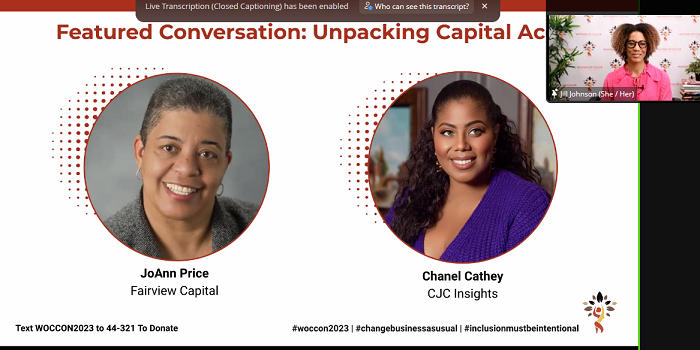Women of Color Talk Entrepreneurship, Access to Capital at IFEL Conference
During the Women of Color Connecting (WOCCON) Summit 2023, a panel featuring JoAnn Price, cofounder and managing partner of Fairview Capital Partners (West Hartford, Conn.), a company that invests in startups founded by individuals from diverse backgrounds; Chanel Cathey, founder and CEO of CJC Insights (New York), a marketing and communications company; and Jill Johnson, cofounder and CEO of the Newark-based Institute for Entrepreneurial Leadership (IFEL), a not-for-profit organization that supports economic development through entrepreneurship, discussed “Unpacking Capital Access.”
Lack of access to capital is a serious issue for women of color who need funds to grow their businesses, Johnson stated during the conference. IFEL seeks to attack this problem by introducing people whose paths might not otherwise cross, creating safe spaces for them to engage in honest conversations about diversity, equity and inclusion; and to inspire action to eradicate systemic exclusion. Johnson started the discussion by asking the panelists to explain “what exists at a systemic level that does not allow capital to flow to women-of-color entrepreneurs more freely?”
Price said that there is a lack of diversity-minded investors and VCs that are “actually focused on diversity, women of color and women in general in terms of building businesses.”
She also noted that sometimes women are risk averse and need to step out of their comfort zones and start building something significant. Women are good at a number of tasks, but they should focus on building a company, using their talents and attributes.
Johnson asked if women often limit themselves because they think that getting the investments and resources they need is too difficult of a challenge. Price said she didn’t think so. The roadblock comes after a woman decides to be entrepreneurial. She then must figure out the resources she needs.
“You need money, you need resources, you need relationships and you need to be able to know enough about yourself to be able to be comfortable when building, and not be afraid of failure,” Price noted.
Price spoke about her own experience building Fairview Capital, explaining how networking helped make it successful. She said that “many hands” reached out across the country to connect her with people. She was told, “I know this person, I know that person” who could help you. But Price also needed to look inside herself and figure out “what it is about you that will enable you to do something that you haven’t done before.” For Price, it was knowing that while she was growing up she always had an “insatiable curiosity, and that curiosity was always more powerful than my fear of failure.”
For Cathey, the lack of capital for women in color impacted her company greatly. When she started her agency, she took note of all the minority women founders she knew about who never got on the cover of business magazines. She thought she could help them tell their compelling stories.
Cathey noted that when she first got started, she had to be creative in how companies could pay for her insights and advice. “When you look at a lot of early-stage founders, they don’t necessarily have the significant capital to invest in marketing and communication strategy early on. So, I had to get very creative. I take equity in companies. I often tell them that just because you don’t have that investment up front, there are creative ways to figure out how to get that talent and that infrastructure knowledge into your business,” she said.
“And I’m very honest. I started my business out of my savings with a credit card, like so many founders do, and I was representing brands like iFundWomen [Montclair], which is a crowdfunding platform for women entrepreneurs that was serving thousands of women who were starting businesses with maybe not a lot of capital up front.” Now Cathey’s portfolio contains unicorns and beginning startups, as well as Fortune 500 companies.
Johnson asked for suggestions on how women of color can overcome systemic challenges. Price said that they should get themselves on boards of directors. “There are many women who will never meet” people who can help them, “unless you’re in spaces that enable that to happen.” These don’t have to be paid positions, but positions that put an entrepreneur in an industry or an area that will let them meet the right people.
. “It’s a way of expanding your base of contacts,” she said. “That’s where you often get a lot of advice from people who will provide connections and also financing along the way. So, that’s very critical and that needs to be done proactively, early on.”
She added a caveat, however: Be careful of the people you bring around you. “You want to be in the presence of positive people, people that strongly encourage you. And I’m talking about friends, family, everybody.” Push out those who have disbelief or doubt, so that you can stay focused on what it is you’re trying to do and be around people that can be helpful, she said.
One of the challenges women of color face is finding financing that’s based on a long-term commitment. “I think it’s one thing to give a short-term investment, but how do we make those businesses more sustainable to last in the long run? Cathey asked rhetorically.
The panelists also discussed how much effort an entrepreneur should put in to obtain grants. They suggested that it isn’t worth it to go after a $5,000 grant because those grants don’t take entrepreneurs far enough in their journey toward building a business.
Price spoke to the women at the conference, saying, “If you are a person of color, and you have had the opportunity to have had a position open up because of what other people have done to enable you to be there,” be the person that helps someone else move forward and take the next steps. “That is so important for our community to do that. And if we don’t do it, shame on us.”




